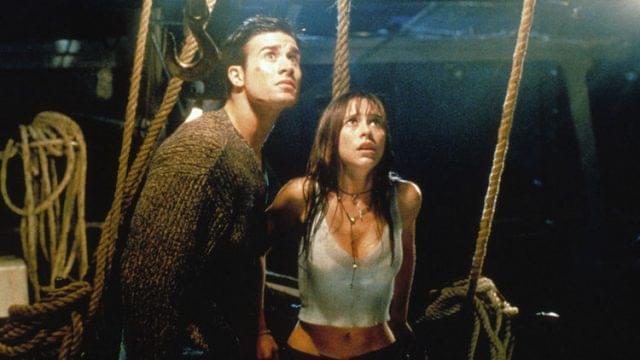
The problem with movies about psychopaths who kill people as an act of revenge against some prior offense is that these psychos almost always wind up going off-message. They’ll be focused on their targets, stalking, lurking, toying with them, and then, randomly, they’ll kill a security guard or a cop — someone who had nothing to do with whatever it is they’re upset about. That’s why I prefer movies about psychos who kill indiscriminately. At least those guys stick to their game plan: They hate humanity, and they want to murder everyone. Simple, elegant, easy-to-follow.
In “I Know What You Did Last Summer,” an inexplicably popular thriller from 1997 with a title that’s far more memorable than its story, we have one of these unfocused revenge killers. For most of the film, the quartet of teenagers he’s pursuing believe he’s after them because they killed him the previous Fourth of July. I think you’ll agree that being murdered by someone is a good reason to be angry with them. The kind of thing will stick in your craw. In fact, it trumps just about every other reason for holding a grudge.
“Why are you so angry at your sister?”
“Because she stole my boyfriend in high school!”
“Oh! I’d be angry too!”
“Yeah. So why are you angry with those four teenagers?”
“Because they murdered me.”
“Oh.” (silence)
But — and here come the SPOILERS — of the five people he manages to kill over the course of the film, only two of them are from that group of teenagers. The other three had nothing to do with it. DON’T TELL US YOU’RE SEEKING REVENGE AGAINST SOMEONE SPECIFIC IF YOU’RE ACTUALLY PLANNING TO KILL RANDOMLY! This is a basic principle of mass-murder that all psychopaths should remember.
But I am getting ahead of myself. “I Know What You Did Last Summer” begins last summer, because that’s when the things that I know you did occurred. It’s the Fourth of July, and two couples are cavorting on a beach in North Carolina, drinking and celebrating their graduation from high school. The characters have names, but it’s easier to refer to them by the actors who play them (or, later in this column, simply by their initials). Ryan Phillippe is a hotheaded jerk, and his girlfriend is Sarah Michelle Gellar. Freddie Prinze Jr. is poor, and his girlfriend is Jennifer Love Hewitt. If you lose track of who’s dating whom, remember that the partners are linked by hair color.
The four are sitting around a campfire talking about the urban legend where a guy with a hook for a hand terrorizes a young couple. They disagree on some of the finer points of the story, and Freddie Prinze Jr. professes a belief that the story is true. So you can write him off as being the smart one.
Later that night, they’re driving on a windy road overlooking the coast when they hit a guy with their car. This leads to a stretch of dialogue establishing that in fact none of them are going to be the smart one.
“He’s dead!” Ryan Phillippe says.
“You’re not a doctor!” Jennifer Love Hewitt replies. “You don’t make that call!” (What, you have to go to medical school to check a guy’s pulse and see if he’s breathing?) DUMB.
“We’ll tell the police the truth!” Sarah Michelle Gellar says. “They’ll believe us!” DUMB.
“If there’s some of him on the car, there’s some of the car on him!” JLH says, misapplying what she has learned on “C.S.I.” DUMB.
There is much debate over what to do with the dead guy. And you know what? If you’re ever in a situation where you have to argue with your friends about what to do with a dead guy, you might need to reevaluate your life. There’s a lot of bumbling as they hide the body so a passing motorist won’t see it, and then more bumbling when they try to dump the body in the ocean and he grabs one of them because whoops, it turns out he’s not actually dead. They throw him in the water anyway, but he snatches SMG’s tiara from off her head (she was named town princess earlier that night), so RP has to dive in and retrieve it from the not-dead-but-quickly-dying man. Now, FINALLY, he’s dead. Except I guess not, because next summer he’s getting revenge on them for killing him. Or for almost killing him. And when I say “revenge,” I mean he’s mad at them but he mostly kills other people. But anyway.
It is JLH, who apparently is our main character (when did that happen?), who first learns of the not-dead man’s interest in getting his non-revenge. She has returned home from her first year of college to find a handwritten note, in all caps, that says, “I KNOW WHAT YOU DID LAST SUMMER!” To me this seems like a happy declaration — it even ends with an exclamation point! — but JLH is terrified. She finds the other three, none of whom are dating or even friends anymore, and tells them about it. RP’s first reaction is to point out that the note is unspecific, and that JLH did a lot of things last summer. Why, perhaps the note-writer is merely referring to the time JLH took a cooking class at the Learning Annex! (DUMB.)
RP’s second reaction is to threaten Max (Johnny Galecki), a local kid who had a crush on JLH and who was the passing motorist that fateful night a year earlier. RP figures Max must have seen something and is now going to blackmail them. RP is wrong, but RP isn’t the type who cares about being wrong as long as he can wear a tank top and punch people. Later that night, the not-dead guy kills Max for no reason whatsoever, other than the movie’s need to show us a death. With only four central characters, you can’t start bumping them off 30 minutes into the film or you’ll run out before the finale.
SMG can’t believe that anyone could have seen what they did last summer. “We were so careful!” she cries, apparently using a different definition of “careful” from the one you and I are familiar with. In an effort to determine who’s harassing them, SMG and JLH visit the woman who they think is the sister of the guy who they think they killed. She’s played by Anne Heche, and she lives in a dumpy rural house, and she wears what looks like a flour-sack dress. The best moment involving her character comes when she gets tired of SMG and JLH and yells, “Get out of my house!,” even though they’re all standing in the front yard at the time.
After some more ominous notes and near-misses, JLH emerges from her ethical cocoon and says she has no problem killing whoever it is that’s bothering them. “I’m not interested in what’s right anymore,” she says. “I’m interested in what’s smart!” Well, it’s about damn time. Unfortunately, this newly expressed interest in not being a bunch of idiots is not implemented. One thing that does change, however, is that while both couples were driven apart by last summer’s trauma (i.e., killing a guy), they have been brought back together again by this summer’s trauma (i.e., being hunted by the guy they killed). In that sense, “I Know What You Did Last Summer” is a romantic drama, showing that the bonds of love are strong enough to withstand even the most heinous manslaughter-cover-up conspiracies and their inevitable horrific aftermath. Love really does conquer all.
— Film.com





